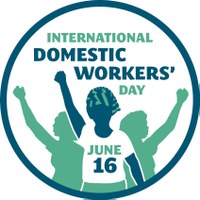Migrante Canada
Migrante Canada marks International Domestic Workers Day by recognizing the important work that migrant caregivers have done in Canada for many decades, and still continue to do, under the many iterations of the federal caregiver program. They are nannies, cleaners, cooks, and caregivers for the elderly, and for those who have disabilities, and are considered vulnerable and precarious workers.
The International Labour Organization’s Convention 189 for Decent Work for Domestic Workers was made possible by global unions and domestic workers on June 16, 2011, and is very significant.
The Convention recognized domestic work as work, like any other work. It also established fundamental labour protections for domestic workers.
Convention 189 reaffirmed what the migrants’ movement has known and has been fighting for in its many decades of organizing domestic workers and other migrant workers in Canada. Domestic workers are pillars of the Canadian care economy and they perform the crucial labour in caring for homes, children, the sick and the elderly, and people with disabilities. Because Canada does not have a national childcare program and lacks the essential (and affordable) home care program, childcare and elderly programs, Canadian families rely on domestic workers so they are able to work outside the home, with the peace of mind that their loved ones are in good and safe hands of their caregivers.
However, while domestic workers, who are usually women, racialized and mothers themselves, contribute to the economy, their work is often undervalued, precarious, and lacking in social, labour and wage protections. Like other migrant workers, they do not enjoy the same rights and benefits as other workers in Canada – simply put, because they are foreign and they are migrant, and easily disposable.
In Canada, the domestic workers, migrant workers and their friends and allies continue to fight for just working conditions, for living wages, open work permits, access to social benefits, and the full exercise of their human, labour, and migrant rights, including coming to Canada as permanent residents, with full PR status on arrival.
The announcement of Immigration Minister Miller in early June on “providing home care workers with permanent residence on arrival in Canada” under the “new, enhanced caregiver pilots” is a great press release, minus the fine print of policy and detailed provisions. Migrante Canada maintains that “pathways” and “access to permanent resident status as soon as they (caregivers) arrive in Canada” are different from caregivers entering Canada with permanent resident status.
Canada has not signed or acceded to two important international conventions, the International Convention on the Protection of the Rights of All Migrant Workers and Members of Their Families (1990) and Convention 189-The Domestic Workers Convention (2011). As a result, there are no commitments or responsibilities in legislation to ensure that Canada recognizes and protects these vulnerable workers, more so when Canada is one of the receiving countries of migrant labour.
On this day, Migrante Canada makes its call of “permanent residence status on arrival for caregivers, now!” even louder. And the same for “Domestic work is work!”
###

